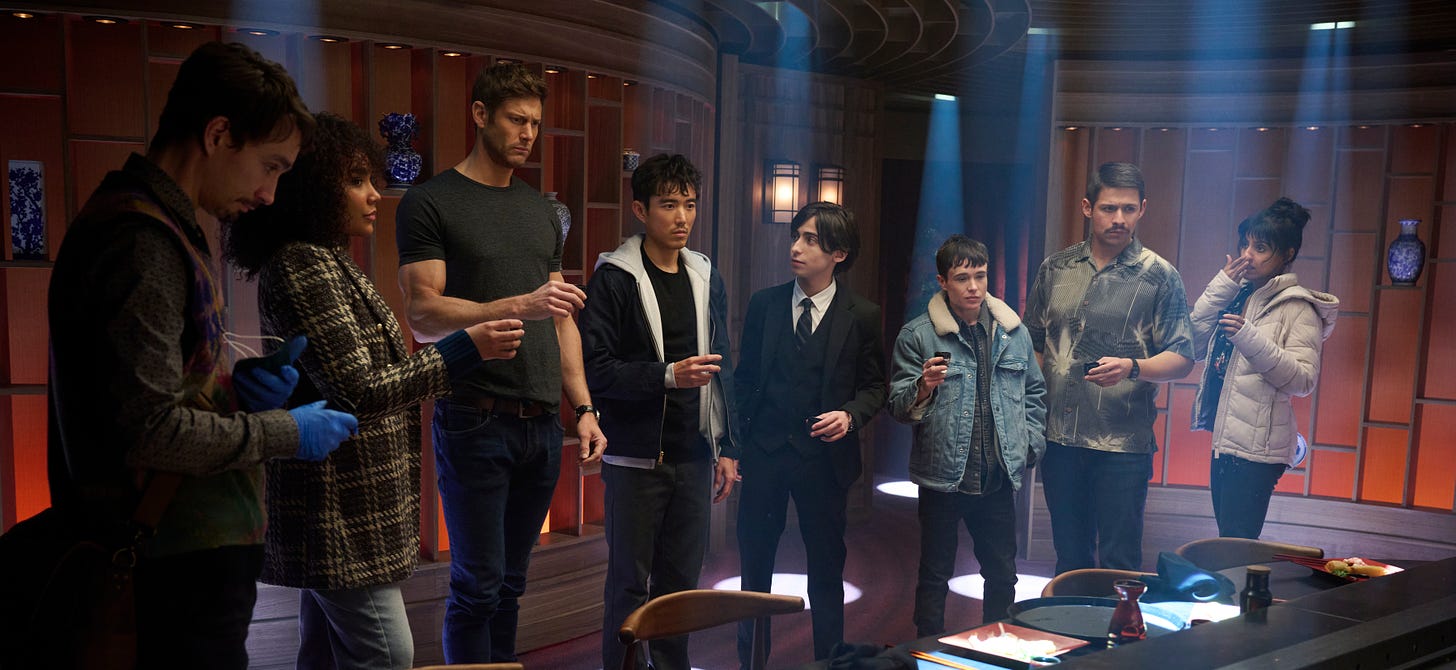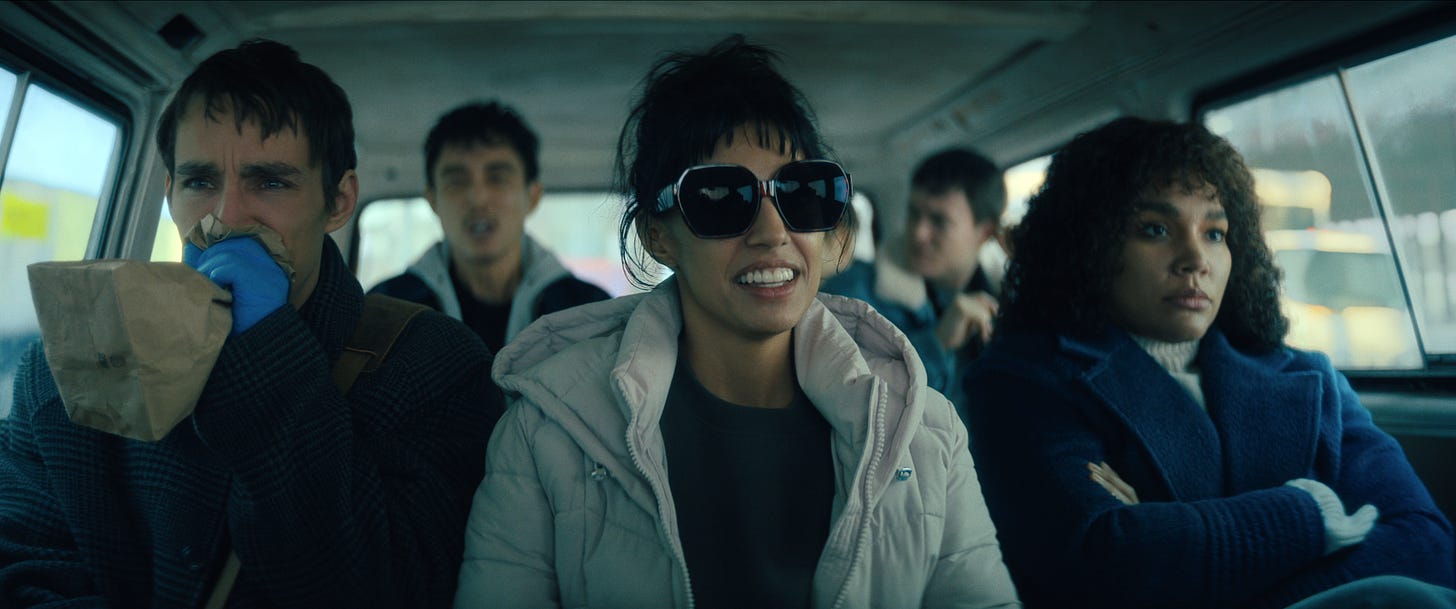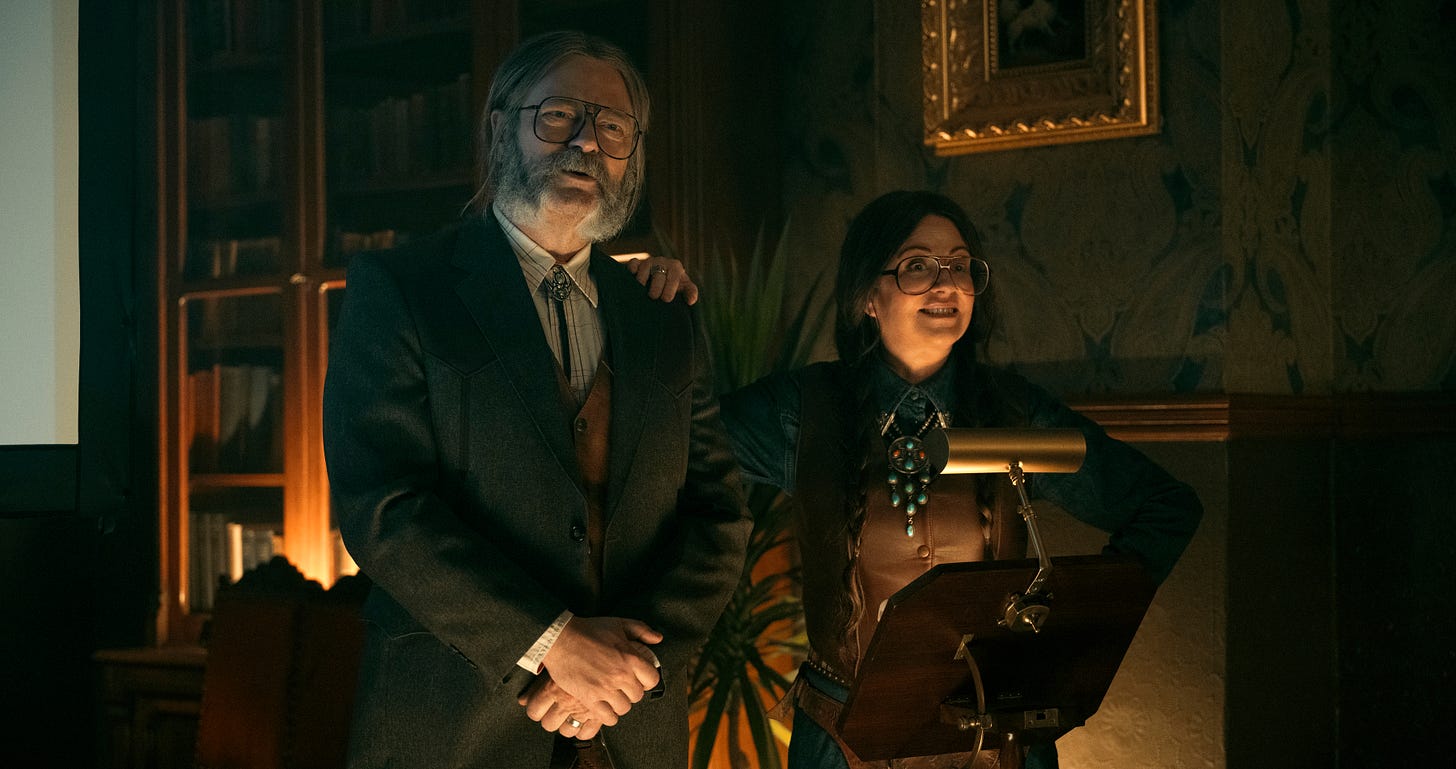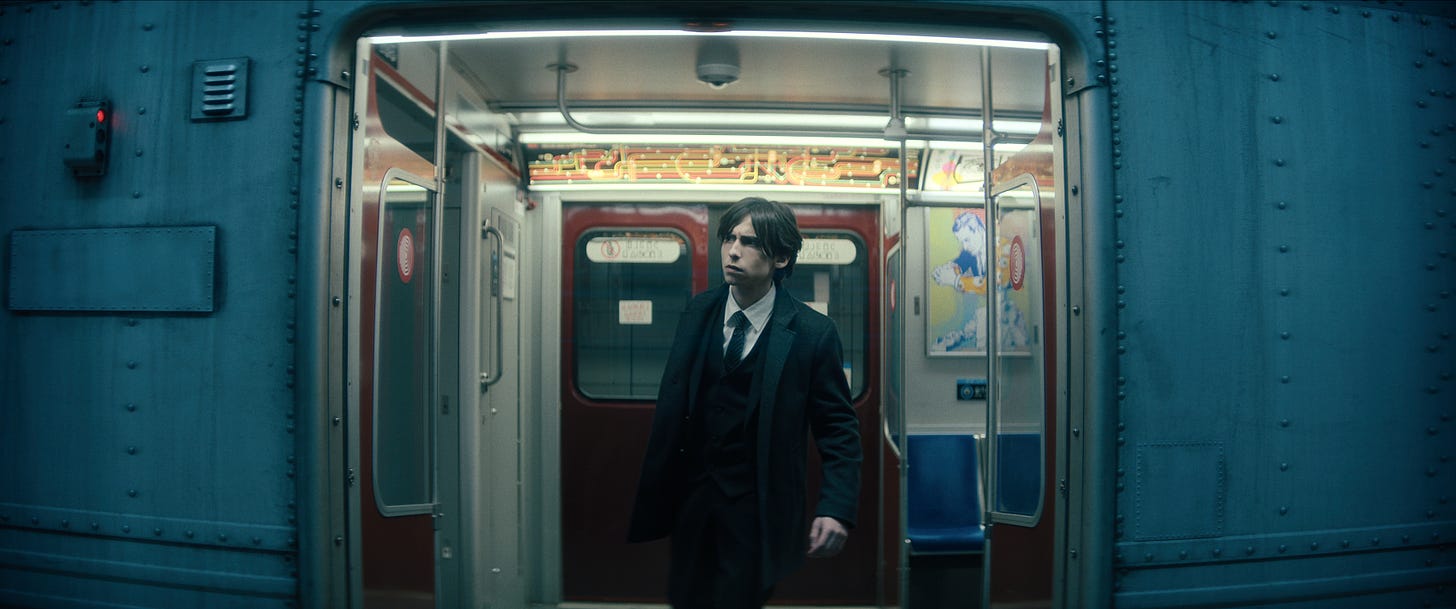Week-to-Week: The Umbrella Academy ends as lovably uneven as it began
A spoiler-free review of the fourth and final season of the Netflix series
Week-to-Week is Episodic Medium’s weekly newsletter about TV and the media industries that is usually written by me, Myles, who is writing this preamble. However, Caroline had reached out about being able to return to her roots covering The Umbrella Academy, and reflect on the final season as it drops on Netflix today. The following newsletter is spoiler-free until a marked spoiler section at the end. To receive future newsletters and learn what we’re covering week-to-week for paying subscribers, join our free mailing list. (And if you want more non-weekly drop-in reviews from our contributors, consider becoming one of those paid subscribers).
A little bit of critic inside baseball is that the later a studio or streamer sets an embargo date for reviews, the less faith they tend to have in the project. They’re likely expecting a negative response and would prefer to debut their project before too much bad buzz can build up. So I definitely took note when Netflix embargoed all reviews of the fourth and final season of The Umbrella Academy until the show actually dropped. Would the season be such an unmitigated disaster that any kind of critical discussion would kill it on sight? Or was Netflix simply trying to bury the show after news broke of the alleged toxic environment created by showrunner Steve Blackman?
Whatever the case, the final season of The Umbrella Academy is neither the calamity Netflix feared nor the unmitigated success they might have hoped. The six-episode season starts strong, gets lost in the weeds, and then ultimately ends somewhere poignant. And while it’s not the sort of season that will suck in new viewers or cement the show’s legacy one way or the other, for those who’ve stuck with the Hargreeves siblings this far, it’s worth seeing them through to the end.
To be fair, I’ve always graded the lovably imperfect show on something of a curve. When the first season debuted back in early 2019, it had a ton of style but not much in the way of substance for its thinly drawn characters—six oddball adults left emotionally stunted by their time as kid superheroes. But there was a “greater than the sum of its parts” charm to the series, largely thanks to its winning cast. After finding a devoted fanbase (it was reportedly Netflix’s third most watched show of 2019, behind Stranger Things and The Witcher), the show introduced some welcome character depth and cohesion in season two, which time traveled back to the JFK assassination. And while season three was more uneven and overstuffed (it was written and filmed mid-pandemic), it managed to hang on to the stronger character work, including weaving in Elliot Page’s real-life transition in a parallel story for his character, Viktor.
Season four picks up where the season three finale left off, with the Hargreeves siblings transported into a “reset” universe where they no longer have powers and the Umbrella Academy never existed. Six years later, they’ve settled into their “new normal” with varying degrees of success. Five (Aidan Gallagher) gets his thrills working as an undercover agent for the CIA, while Diego (David Castañeda) and Luther (Tom Hopper) have found less fulfilling post-superhero careers. Allison (Emmy Raver-Lampman) and Klaus (Robert Sheehan) are housemates, while Viktor (Page) is more of a loner. And Justin H. Min’s Ben—who originated from a different alternate universe than his siblings—is unsure where he fits into all of this.
The show is at its best in the first half of the season, as it zeroes in on the sweetly dysfunctional hangout vibe that first made the series such a hit. The Hargreeves may be living very different lives than we’ve seen them live before, but the actors and writers know these characters so well that every move still feels true—whether it’s Lila (Ritu Arya) putting her manic energy towards more suburban pursuits or Luther bringing his Boy Scout Troup leader vibes to a family reunion. Four seasons in, it’s a joy to watch the show pair up just about any two actors and watch how they bounce off one another.
The season also finds some intriguing new antagonists in Drs. Gene (Nick Offerman) and Jean (Megan Mullally) Thibedeau—married community college professors dedicated to convincing people that alternate universes exist. It’s a riff on the Mandela effect that feels like both an allegory for right-wing conspiracy theories and left-wing bemoaning about “living in the wrong timeline.” And Offerman and Mullally fit right into The Umbrella Academy’s canon of soft-spoken yet fully wackadoo antagonists.
But that strong start soon gives way to a season that lacks any real sense of drive or focus. In a 2022 Tudum interview tied to the announcement of season four, Blackman bragged, “As every good Umbrella fan knows, no moment in the show exists in isolation. Everything we see has meaning.” But that just really doesn’t seem to be the case here. A lot of the dangling threads of season three (the return of Allison’s husband Ray, the loss of Luther’s wife Sloane, that shot of Ben on the Korean subway) don’t pay off in any kind of meaningful way. And though the season ostensibly centers on the mystery of (original) Ben’s death and how it connects to something called “the Jennifer incident,” that doesn’t really feel like where Blackman’s interests actually lie. Once the Hargreeves split off into various subplots, it quickly becomes clear they don’t all have equally compelling material to work with, despite the best efforts of the cast.
Part of the problem could be that while Blackman and his writers were directly inspired by Gerard Way and Gabriel Bá’s Umbrella Academy comics for the show’s first three seasons, they’ve run out of source material to follow here. But I also wonder if the show’s writers originally planned this season to fit their usual 10-episode order, only to have to condense things when Netflix decided it wanted just six episodes. That would certainly explain the odd mix of filler storylines and rushed endings that characterize the back half of the season.
Indeed, while the fight scenes are as bloody and brutal as ever, the overall production feels cheaper and more small-scale this year. The stylistic flourishes that once defined the show are fewer and far between (including an egregious lack of sibling dance sequences). And the overall vibe is that Netflix just wanted to get things over with rather than truly invest in one last outing. Unfortunately, without the razzle dazzle, the show’s fundamental storytelling weaknesses become more apparent. There are no shortage of “fridge logic” moments, where the show’s internal logic collapses as soon as you think about it. And the final three episodes all but fall apart on a plot level in real-time. (The season is also very randomly set at Christmas, and I’m still not sure why.)
Still, for me at least, there are two big emotional swings in the back half of the season that made the chaotic plotting worth watching. One pairs Five and Lila in a timeline-hopping subplot that embraces the kind of quirky yet poignant sci-fi worldbuilding Umbrella Academy does best. It’s a worthy showcase for the series’ two most talented performers. And given how much Gallagher’s “old man stuck in a young man’s body” performance has been the heart and soul of the show since the beginning, it’s nice to see him get one last meaty storyline; especially as he gets to evolve his precocious kid shtick into something more mature.
And though the season sometimes seems to be hedging its bets about whether it actually wants to end or not, the finale does eventually find a meaningful place to leave the Hargreeves. If there’s a messiness to how this season unfolds, there’s a boldness too. Emotionally, there are shades of both the Lost finale and The Matrix Revolutions at play. And though I suspect there are some choices that will be divisive among the fanbase, it’s nice to see the show go out while it’s still able to make big swings.
In fact, though I’d rank season four on the weaker side of The Umbrella Academy’s run (season two is still my favorite), its high highs and low lows feel fittingly reflective of the series as a whole. The Umbrella Academy has never been a perfect show. But in a sea of bright and shiny superhero fare, it offered a uniquely dysfunctional tone—and an endearing cast—I’m really going to miss.
Spoilers and Stray Observations
I quite literally couldn’t make heads or tails of whatever was supposed to be going on with the Ben and Jennifer story, and find it a little insulting that Justin H. Min was reduced to going out as a big weird blob man when he’s been a member of The Umbrella Academy since the beginning. True, his take on alt universe Mean Ben never worked as well as his portrayal of Sweet OG Ben, but I still feel like he deserved better than this.
Klaus’ bizarre sex worker medium storyline is what convinced me this season was originally planned for a longer run and then condensed to just six episodes. It’s the sort of filler storyline you could maybe get away with in a longer season, but which sticks out really awkwardly here. Same with David Cross’ non-arc as Sy Grossman.
After Allison/Luther was too weird to be sweet and Luther/Sloane was too sweet to be weird, Blackman finally gets the oddball romance balance right with Five/Lila—which was both shocking and unexpectedly compelling? Realizing we’ve watched Aidan Gallagher age from literal child to budding teen heartthrob (he feels like he could be the next Timothée Chalamet) is jarring in a way that effectively reflects how weird Five’s life has been. And while Gallagher and Ritu Arya have always had great chemistry together, there’s also an innocence to the whole thing that keeps it on the right side of creepy. I’m still a Lila/Diego shipper at heart, but I like how messy and unresolved everything wound up being in the end. Feels true to The Umbrella Academy’s overall vibe.
I’ll be very curious to hear how people feel about the ending! I was pretty detached from the rest of the finale, but got really invested when I realized the show was actually going through with the idea of The Umbrella Academy sacrificing themselves to save the universe. I thought the final goodbye scene was perfectly played in both its comedy and its poignancy, and I’m so glad the show didn’t wind up pulling its punches (at least depending on how you read that post-credits marigold scene, I guess). The ending is both nihilistic and hopeful, which feels true to the spirit of the show. And while the season as a whole lacked some pizazz, all those final cameos were a really fun nod to the show’s history.








*sigh* The season was a big disappointment. I wonder when Netflix decided to shorten the season (and series) because the season was all over the place and barely cognizant with the rest of the show. I enjoyed the early episode where they all traveled to Maine, and there were good moments otherwise, but overall: dropped plot points, uncharacteristic character choices/personalities, strange plot decisions that ultimately went nowhere, minimal music moments (although I giggled with the Baby Shark refrain), and more. It's like the showrunners read a semi-coherent summary of the show and ran with it rather than actually understand their own show.
Me not have seen any of this yet, but me am completely on board knowing full well show is and always has been wildly uneven. Somehow, that part of its charm. (And for whatever reason, me have more fun watching uneven show like this or Star Trek Discovery than something masterfully done like Succession or Wire). Anyway:
> it quickly becomes clear they don’t all have equally compelling material to work with
This has been show from beginning and big reason for why show is so uneven. But that largely because they struck casting gold with Gallagher and Ritu Arya (and Elliot Page reliably great, but they knew that going in). So it pretty much has always been Five and Viktor Show, but me not really have problem with that. It pretty much impossible to have balanced ensemble where every actor equally great. Cheers, maybe? WKRP? Me have to go that far back. Even Sesame Street have Bert and Ernie, and then less-enduring characters like Gladys or Dr. Nobel Price.